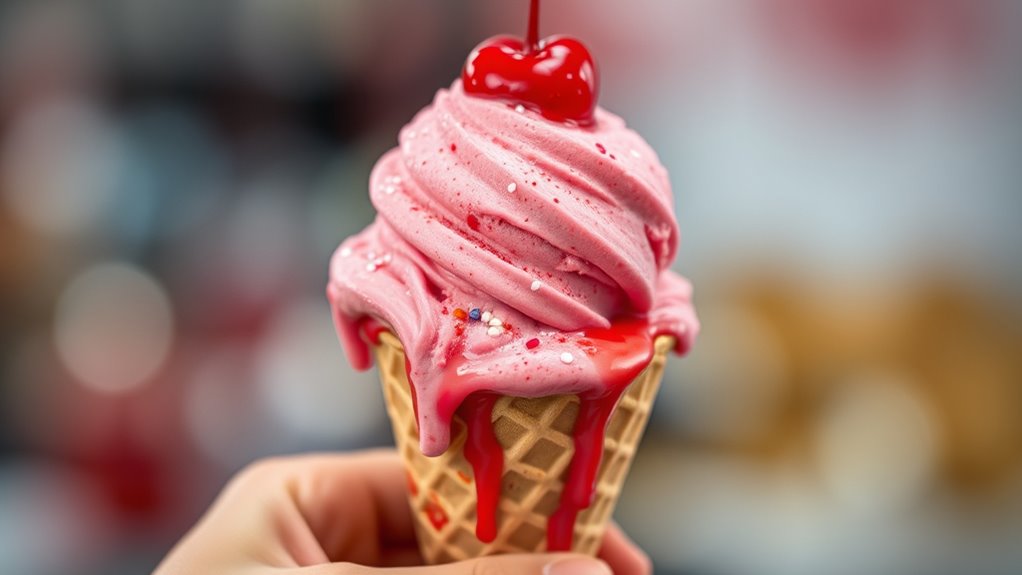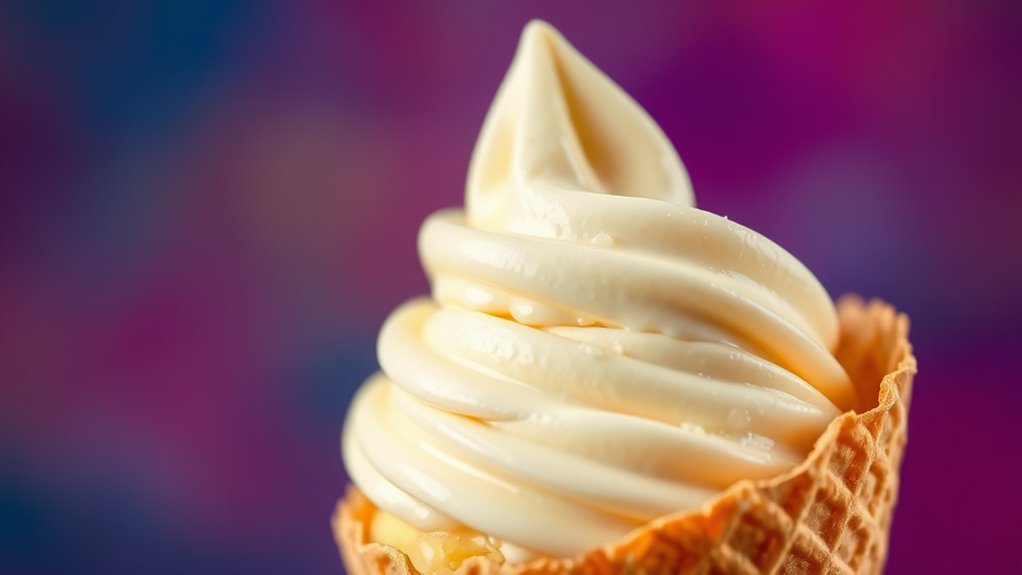Ice cream can be surprisingly addictive because its high sugar content triggers your brain’s pleasure response, releasing dopamine that creates feelings of reward and happiness. Emotional triggers and stress often boost your cravings, making it harder to resist just one scoop. Over time, this reinforces a cycle where your brain begins to see sugar as necessary for comfort. Stick around, and you’ll discover ways to understand and manage these irresistible cravings more effectively.
Key Takeaways
- Ice cream triggers dopamine release in the brain, creating feelings of pleasure that reinforce repeated consumption.
- Emotional triggers and stress can intensify cravings, making it harder to resist more than one scoop.
- Frequent intake can lead to sugar dependence, where the brain begins to see ice cream as necessary for happiness.
- The neurological reward system associated with sugar makes resisting future cravings increasingly difficult.
- Understanding these brain chemistry factors can help develop strategies to manage and reduce ice cream cravings.

Have you ever wondered why some people find it so hard to resist ice cream? It’s not just about enjoying a sweet treat; for many, it’s a powerful craving that’s tough to ignore. This is often connected to emotional cravings—those moments when you reach for ice cream not because you’re hungry, but because you’re seeking comfort, distraction, or a way to lift your mood. These emotional triggers can cause you to associate ice cream with relief, making it more tempting during stressful or emotional times. Over time, this pattern can deepen into sugar dependence, where your brain starts to crave the sweet stuff almost automatically, creating a cycle that’s hard to break.
Emotional cravings for ice cream can lead to sugar dependence and a difficult cycle to break.
When you indulge in ice cream frequently, your brain begins to associate its consumption with pleasure. The high sugar content triggers the release of dopamine, the neurotransmitter responsible for feelings of reward and happiness. This flood of dopamine can make you feel good in the moment, reinforcing the desire to have ice cream again and again. As a result, your brain starts to rely on that quick dopamine hit, making the act of resisting become increasingly difficult. The more you indulge, the more your brain begins to see sugar as a need rather than a treat, leading to sugar dependence. This dependence isn’t just about physical cravings; it’s a complex interplay of emotional and neurological factors that heighten your desire for ice cream.
You might notice that after a long day or during stressful situations, the craving for ice cream intensifies. That’s because emotional cravings are powerful—they tap into your subconscious and emotional state, making you seek comfort in a familiar, sweet flavor. This emotional connection can override your rational decision-making, convincing you that you need ice cream to feel better. Over time, these habits can contribute to a cycle where emotional cravings reinforce sugar dependence, making it harder to stop at just one scoop. Understanding how brain chemistry influences cravings can help you develop more effective strategies to manage your desires. It’s not just about willpower; it’s about understanding how your brain and emotions are working together to create this irresistible pull.
Breaking free from this cycle requires recognizing the emotional cues that lead you to reach for ice cream. Finding healthier ways to cope with stress or emotional discomfort can help reduce reliance on sugar. By addressing the emotional cravings directly and understanding the science behind sugar dependence, you can regain control and enjoy ice cream in moderation, rather than feeling powerless to resist it.
Frequently Asked Questions
Can Ice Cream Cravings Indicate a Nutrient Deficiency?
You might wonder if your ice cream cravings signal a nutrient deficiency. While craving triggers often include sugar or fat desire, sometimes they hint at missing nutrients like magnesium or zinc. However, most cravings are more about taste preferences or emotional comfort. If you regularly crave ice cream, consider if your diet lacks certain nutrients, but often, these urges are driven by habit or mood rather than actual deficiencies.
Does Eating Ice Cream Regularly Lead to Long-Term Health Issues?
Imagine your health as a delicate garden; regularly indulging in ice cream can be like weeds taking over. If you have dairy intolerance or develop sugar dependence, it could lead to long-term issues like inflammation or digestive disturbances. Consistent consumption might also spike your risk for weight gain and metabolic problems. So, while a scoop now and then is fine, frequent treats could quietly undermine your well-being over time.
Are Certain Flavors More Addictive Than Others?
You might notice that certain flavors feel more addictive due to their sensory appeal and your flavor preferences. Rich, sweet, and creamy options like chocolate or caramel often trigger stronger cravings because they stimulate your taste buds and release feel-good chemicals. Your individual preferences influence which flavors you find hardest to resist, making some ice cream varieties more tempting than others. Ultimately, your unique sensory response plays a key role in your desire to keep scooping.
How Does Emotional Eating Influence Ice Cream Consumption?
Emotional eating is like reaching for a comforting blanket, providing instant relief. When emotional triggers strike, you might turn to ice cream as a comfort food, seeking solace during stressful or sad moments. This habit reinforces your craving for sweet, creamy treats, making it harder to resist. Understanding this connection helps you recognize emotional triggers and find healthier ways to cope, breaking the cycle of emotional eating and overindulgence.
Can Ice Cream Addiction Be Treated or Managed Effectively?
You can manage ice cream cravings effectively through nutritional therapy and behavioral modification. Focus on balanced eating habits that reduce reliance on sugary treats, and develop healthier coping strategies for emotional triggers. By understanding your habits and making gradual changes, you can break the cycle of overindulgence. Consistent support and patience are key; with time, you’ll find it easier to enjoy ice cream in moderation without feeling deprived.
Conclusion
So, next time you find yourself reaching for that third scoop, remember it’s not just in your head. While ice cream does trigger pleasure centers in your brain, it’s okay to indulge occasionally. You’re not powerless—just mindful. Enjoying ice cream can be part of a balanced life; it’s all about moderation. Don’t let the fear of addiction stop you from savoring sweet moments. Treat yourself, but keep control—you’ve got this.








